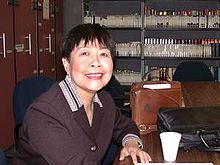Dai Qing
Dai Qing ( Chinese 戴晴 , Pinyin Dài Qíng ; * August 1941 in Chongqing ) is a Chinese journalist , writer , dissident and environmental activist who has become known to a broader public primarily through her actions and books against the Three Gorges Dam .
biography
Dai Qing was born in Chongqing in August 1941, the daughter of Fu Daqing , a well-known communist and intellectual, and Yang Jie. After her father was killed by Japanese soldiers in 1944, she was adopted by Ye Jianying , an important politician and military officer and friend of her father.
In 1966, Dai Qing graduated from Harbin Military Academy with an engineering degree. After that she went to Japan for further training for some time. After her return, she initially worked for the military and was then sent to work in the country with her husband Wang Dejia as part of the measures of the Cultural Revolution , while they had to leave their daughter Wang Xiaojia behind in Beijing. After her return, she worked again for the army, but no longer as an engineer. In 1982 she left the army for good and began working as a journalist for the Guangming Daily newspaper .
In the following period, Dai Qing began to emerge as a dissident and environmental activist, particularly criticizing the project of the Three Gorges Dam. In 1989 her book Yangtze! Yangtze! , which brought her international fame and recognition, but at the same time led to an increased confrontation with the Chinese government. Persecution of dissidents after the Tian'anmen massacre resulted in their arrest on July 14, 1989, and a 10-month sentence. After she was released in 1990, she publicly quit the Communist Party and went back to Beijing. She stopped working as a journalist because she has been banned from publishing in China since 1989. However, she continues to work (privately) as a writer and activist.
In 1992 she received the International PEN Award for Freedom for her work and in 1993 she received the Goldman Environment Prize .
In September 2009, Dai Qing's appearance at the symposium China and the World - Perception and Reality at the Frankfurt Book Fair caused a scandal. When she and the Chinese exile Bei Ling were given the opportunity to make a statement, the official Chinese delegation left the room in protest. There had been disputes about invitations from Chinese critics of the regime in advance. In response to pressure from the partner country of the 2009 Book Fair, China, the planned invitation for Dai Qing was canceled or not delivered. However, this led to strong criticism in the German public, as a result of which the exhibition management, in consultation with the Chinese delegation, revised its position and invited Dai Qing and Bei Ling to the symposium. However, the fair management had not informed the Chinese delegation that the two regime critics should be given the opportunity to speak briefly. This then led to protests by the delegation when the regime critics were given the floor.
On the occasion of the awarding of the Nobel Peace Prize to Liu Xiaobo in December 2010, the writer criticized Western Sinology . Some sinologists talked about the regime nicely by speaking of authoritarianism instead of dictatorship.
“China has money. As a German scientist ... you can have a good time here. Research grants and honorary doctorates are in abundance here ... Those in power want to impose their worldview on others. With every nice talker there is, they take a step further. "
swell
- Interview with Dai Qing in Focus from July 17, 1995 (No. 29)
- Short biography on a website of the University of Zurich (PDF; 2.21 MB)
- Short article about Dai Qing in Business Week
- Geremie Barmé, Jonathan Unger: The Case of Dai Qing . In The New York Review of Books . Vol. 52, No. 18, November 17, 2005
- Claus-Jürgen Göpfert: Sorry to Dai Qing - Interview and short biography on the Frankfurter Rundschau website from September 13, 2009
Individual evidence
- ^ Anne Seith: Zoff at book fair symposium - Chinese delegation causes a scandal on Spiegel Online from September 12, 2009
- ↑ Kai Strittmatter : Die Chinaversteher , Süddeutsche Zeitung, No. 286 of December 10, 2010, p. 15
| personal data | |
|---|---|
| SURNAME | Dai Qing |
| ALTERNATIVE NAMES | 戴晴 (Chinese) |
| BRIEF DESCRIPTION | Chinese journalist and environmental activist |
| DATE OF BIRTH | August 1941 |
| PLACE OF BIRTH | Chongqing |
